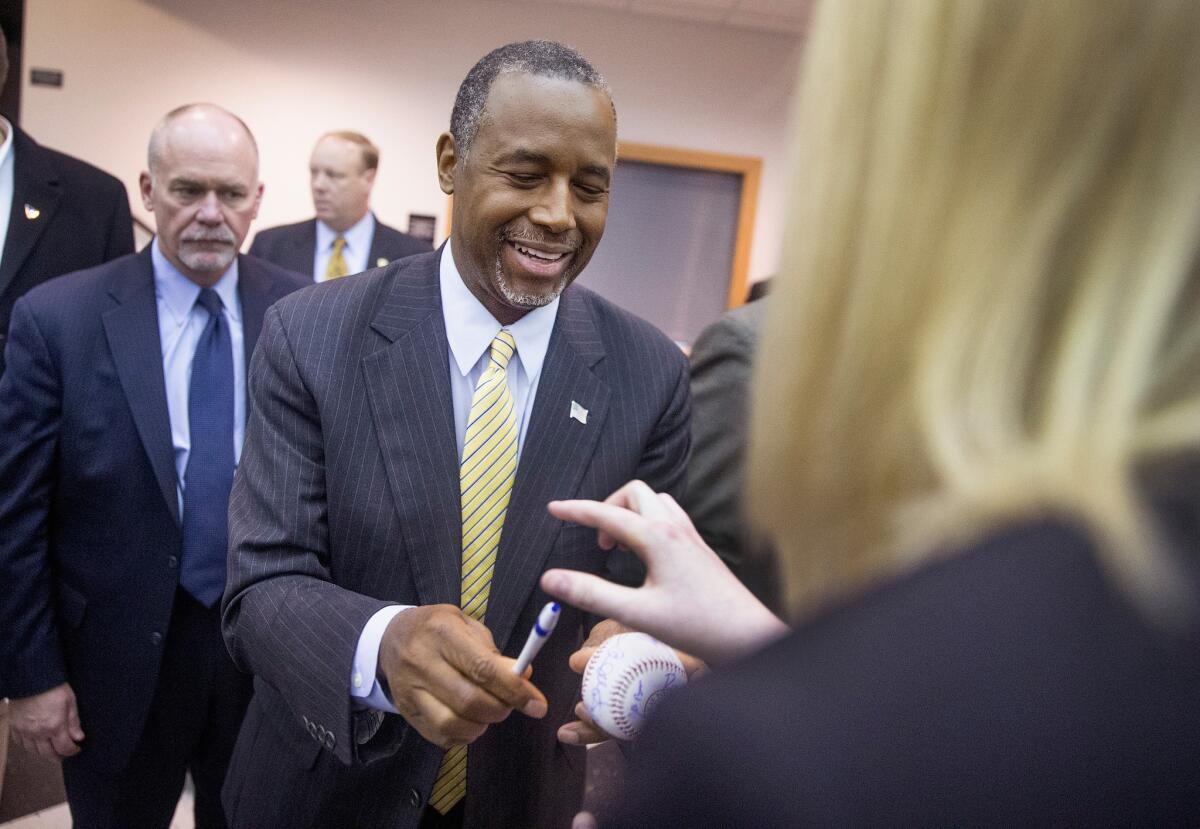Donors gave a super PAC $6 million. Candidates actually got about $140,000.

Republican presidential candidate Ben Carson greets guests at a barbecue over the weekend in Wilton, Iowa.
Reporting From Washington â Before he entered the race for the White House, Ben Carson signed on to a campaign to raise money to fight Obamacare. When Juanita McMillon saw his name, she was eager to get out her checkbook.
âI think he is sincere, and I think he is honest, and I think he is exactly what we need,â said McMillon, 80, from the small town of De Kalb in northeast Texas. She gave $350.
Her money went to the American Legacy PAC, an organization with ties to former House Speaker Newt Gingrich. With Carson as the face of its Save Our Healthcare campaign, American Legacy raised close to $6 million in 2014 â and spent nearly all of it paying the consultants and firms that raised the money. Just 2% was donated to Republican candidates and committees, financial reports show.
âIâm really careful who I give money to, but I guess I did not read it close enough,â McMillon said, adding that she had never heard of American Legacy. âI prefer to give money to individuals, and I assumed, I guess, that Dr. Carson was getting my money.â
Though American Legacy didnât raise much money for Obamacare-hating Republicans, it was a success at something else â finding people willing to give to Carson. Using those names, and another list generated by a second âsuper PAC,â Carsonâs campaign built a network of individual donors that has far outraised those of his rivals.
The fundraising operation also has proved rewarding for the consultants running it. The founder and treasurer of American Legacy, a Virginia-based direct-marketing consultant, is now a senior finance advisor for Carsonâs campaign, which has paid his firms $2.8 million.
The story behind the creation of Carsonâs fundraising network is another example of the way that super PACs, which are supposed to be independent from campaigns, have become more entangled with candidates than ever before. It also illustrates how effective the checks of tens of thousands of small donors, many of them of modest means, can be at enriching campaign consultants.
Unleashed by Citizens United and other court decisions, super PACs have spent lavishly on ad campaigns.
But American Legacyâs approach was different. Using old-school tactics like direct mail and telemarketing â mainstays of conservative fundraising campaigns for decades â consultants sent out blanket appeals, âprospectingâ for passionate Carson supporters.
Many turned out to be older, conservative voters captivated by his religious faith and up-from-poverty life story.
One of them was 90-year-old Hazel T. Donnell, from Centennial, Colo., who gave $300. Like McMillon, she said she didnât know she was giving to American Legacy.
âI didnât give to anybody but Ben Carson, not to any other organization,â Donnell said. âI thought it was all about Carson.â
âI trust him absolutely,â she said. âWashington to me right now is one big mess of a bunch of lies.â
When Carson entered the race, the campaign tapped those donors again. Donnell gave another $250 to the campaign, and McMillon another $450. Of the more than 4,000 donors to American Legacy, more than 25% also ended up giving to the Carson campaign, a Los Angeles Times analysis showed.
The American Legacy effort was âone of a half-dozen things that added up to the notion that he could be viableâ and convinced Carson to run, said Doug Watts, a Carson campaign spokesman.
âThatâs when we found out how much equity he really had out there,â said Watts. âHe attracted a lot of interest, a lot of donations, a lot of engagement and thatâs how direct marketing works.â
Using the same playbook, and some of the same firms, the campaign pulled in about $20 million during the third quarter, far more than any other GOP candidate. But itâs also costing Carson a lot to keep his fundraising machine going â more than $14.7 million this year for mail, phone and Web marketing firms, postage, printing and other expenses. Another $1.2 million went to political consultants, campaign reports show.
Watts defended the American Legacy effort and offered reassurance to donors. âI would say to those people, you did give to Dr. Carson,â Watts said. âThey participated in the building of a listâ of donors for the campaign.
American Legacy was founded in 2010 by Gingrich and his wife, Calista, along with Mike Murray, president of a marketing firm called TMA Direct. The committee has a history of churning donorsâ money in fundraising costs.
In 2013, the group raised about $2 million and spent nearly all of it on consultants, contributing just $42,750 to candidates. The Gingriches and Murray did not respond to requests for comment.
Thereâs no rule that says political committees canât burn up contributions on costs. Federal election law says only that candidates canât spend campaign money for personal use. And even that rule doesnât apply to independent committees, says Kenneth Gross, an election and ethics lawyer who served as chief enforcer at the Federal Elections Commission.
âA political committee has no fiduciary duty to its donors,â Gross said. âIf I have a PAC and want to spend it on a trip to Atlantic City, thatâs fine,â as far as the law is concerned. (All spending must be reported accurately, he said, and taxes paid if funds go to personal expenses.)
In January 2014, with his political reputation already on the rise, Carson became chairman of the Save Our Healthcare campaign. In a video, he said Obamacare was âseriously flawed.â
âWe can once again have the greatest healthcare system on Earth, if Washington gets out of the way,â he said. The phone number in the video rang at Infocision, a telemarketing firm in Akron, Ohio.
Carson, the soft-spoken retired neurosurgeon, turned out to be a fundraising powerhouse. But just as before, there was little left over for candidates. American Legacy gave a total of $143,750 in 2014 for midterm campaigns; most of the money went to costs and to Infocision and other vendors. Murrayâs firms received $248,000.
Once the marketing firms find donors, the names turn out to be business assets. Murrayâs firm offers the donor lists, including names of people who gave to American Legacy and to Gingrichâs 2012 presidential campaign, to other organizations for a fee. After Gingrich quit the presidential race, leaving big debts, Murrayâs firm generated more than $1 million by renting those lists to other clients, reports show.
Direct marketing also drove fundraising for Run Ben Run, the pro-Carson super PAC that changed its name to the 2016 Committee. That groupâs list of donors also was used to jump-start Carsonâs campaign.
Thatâs legal, provided the outside groups charge campaigns a fair rate. Watts said that happened in both cases.
Those early mass mailings, financed by the outside groups, will probably prove to be a huge boon to Carsonâs fortunes, said Candice Nelson, a government professor at American University. The big expense of such fundraising tactics comes at the beginning, she said, in scouting for the donors.
âUsually, once people give, theyâre invested, and they continue to give,â she said. âThatâs why once you have a house list, itâs something that can provide a steady source of income to a campaign. Because they are small donors, they usually donât max outâ by reaching the individual contribution limit of $2,700.
More than 550,000 people have given money, Watts said, more donors than to any other Republican candidate. Carson ended the third quarter with about $11 million cash on hand, less than Texas Sen. Ted Cruz but more than former Florida Gov. Jeb Bush, whose fundraising has lagged.
Carson has made a point of thanking his fundraising workers, appearing with Murray at a rally at an Infocision call center. âWhat an enthusiastic group ⌠dedicated, hardworking people who truly want to see this nation change,â he said in a campaign video.
Infocision has received about $2 million, and an Akron digital firm called Eleventy Marketing Group, run by an Infocision veteran, has received $4.7 million.
Some experts say that kind of campaign model is difficult to maintain.
âYou actually want to get enough money to campaign,â said Larry Noble, another former FEC attorney who is senior counsel for the Campaign Legal Center, which advocates for tighter election spending rules. âThere are a lot of other costs, for ads, for travel, that canât be sustained when youâre paying a lot of money for fundraising.â
Only one candidate has more individual donors than Carson â Democrat Bernie Sanders, with about 680,000. But Sandersâ campaign, with an emphasis on digital fundraising, is spending less than a quarter of the total on fundraising costs, reports show; Carson is spending more than half.
Watts shrugs off the skepticism, saying costs are high because the campaign continues to spend heavily to scout for new donors. âWe are purposely, strategically building a list, and building a list is like putting money away for a rainy day,â he said.
He said money was still rolling in, with $7 million in November. And he said the direct marketing, along with social media, also builds a grass-roots army of Carson volunteers.
âAnyone can discount it if they like, at their own peril,â Watts said. âI think I know 14 other campaigns that would love to have the same problem.â
For more campaign coverage, follow @jtanfani
ALSO
Trump often says things that arenât true, but they fire up the faithful
Sanders pledge illustrates how plans to curtail mass incarceration fall short
Why Iowa clings to the top of the campaign calendar, despite a spotty record of picking candidates
More to Read
Get the L.A. Times Politics newsletter
Deeply reported insights into legislation, politics and policy from Sacramento, Washington and beyond. In your inbox three times per week.
You may occasionally receive promotional content from the Los Angeles Times.












